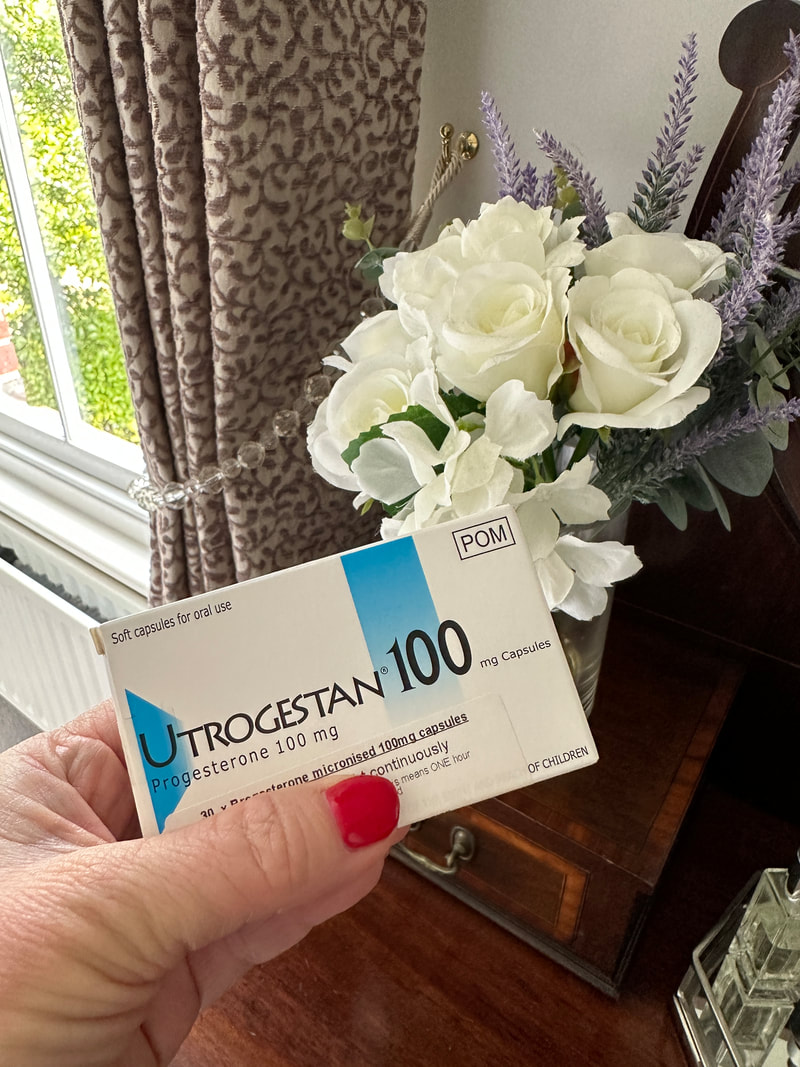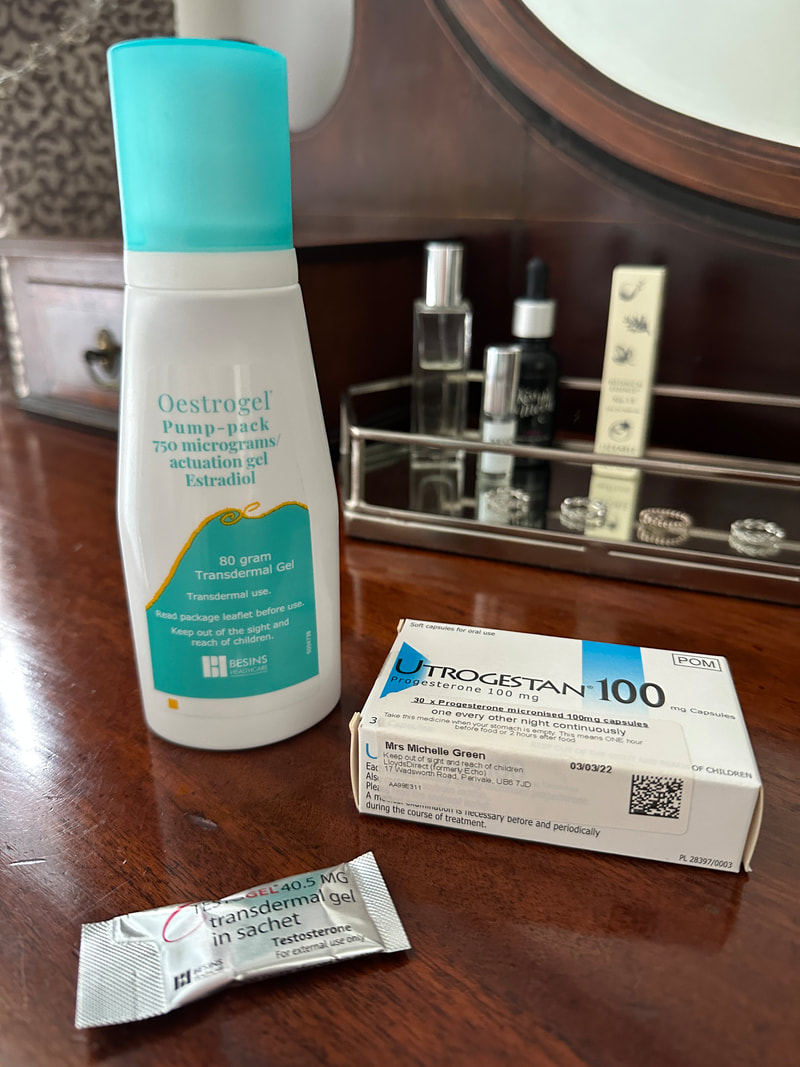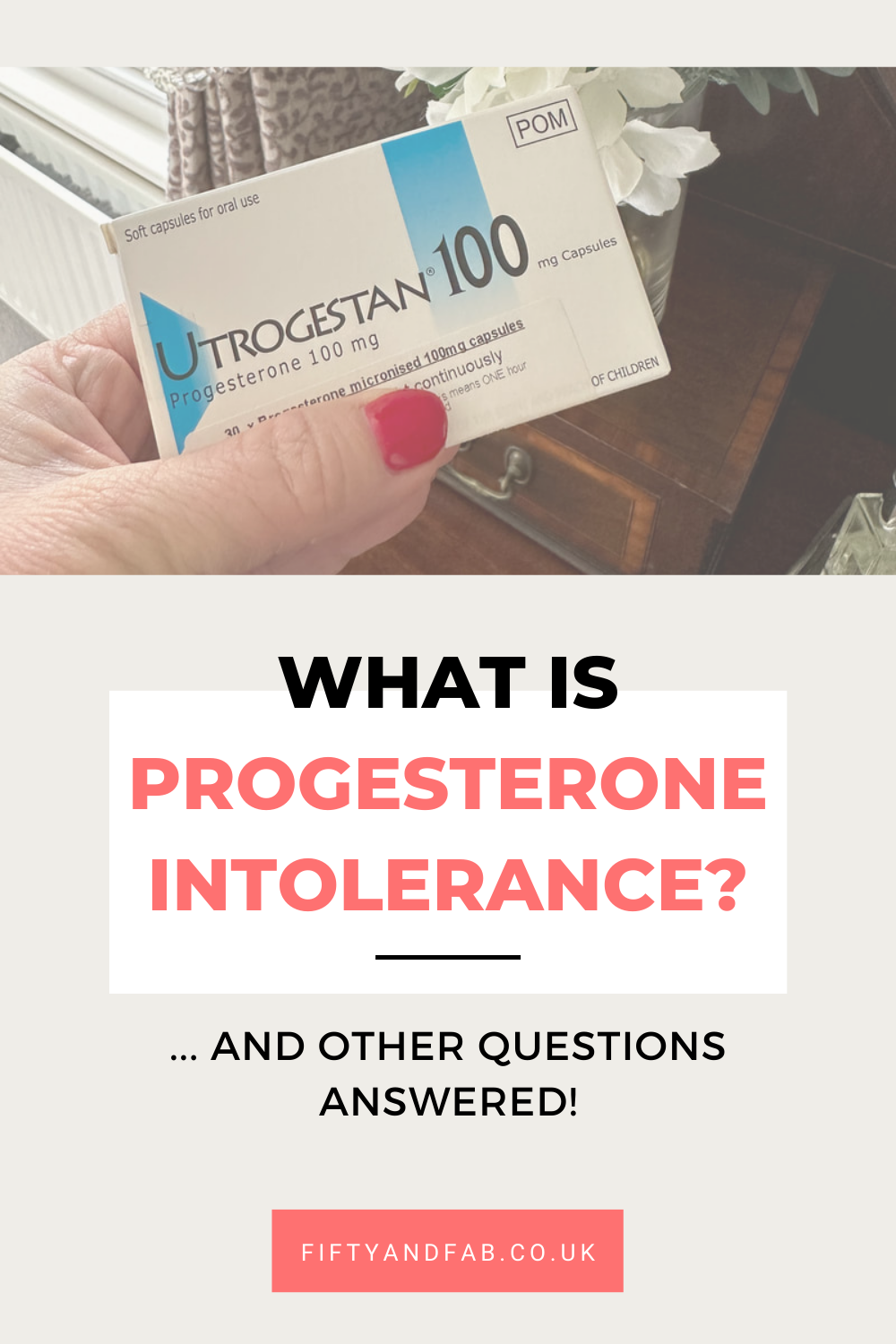|
HRT can be life changing for so many of us, but it can also be challenging to navigate and does not work for everyone. One of the difficulties of taking hormone replacement therapy can come from the progesterone element causing progesterone intolerance. It is a subject discussed on many of the menopause support groups I belong to and I am still trying to overcome it myself. Some of my most read blog posts are about HRT, many of you are looking for good quality advice, a little bit of support and understanding and above all a listening ear that can relate to the difficulties you are facing, real stories can make us feel less alone. I understand! And I've done the research for you. When I realised I was intolerant to progesterone (both the Mirena Coil and Utrogestan - a micronised body-identical progesterone) I spent many many hours trying to find a solution and the best advice. I did not want to come off oestrogen as it was helping me so much. My story is unique and I am fortunate to be able to see a private menopause specialist who is supporting me but understanding progesterone intolerance is often the first step towards getting the right help so you can continue on your HRT journey. Adele Johnston is a Certified Menopause Coach, a qualified Nutritionist, a Positive Psychology Coach and a Breathwork Facilitator. She had to navigate her own early menopause at the age of 37 and she is deeply passionate about empowering women to reclaim who they are inside and out. She left her 20 year corporate career due to her menopause symptoms and she now helps other women reclaim their identify, their body and their confidence. Adele holds nothing back with her mission to 'Make Menopause Mainstream' by educating others and is making waves in helping other coaches up-level their client approach. I 'met' Adele online, via her informative Instagram account @the.menopausecoach and loved her content so I asked Adele to write a guest post for me to explain exactly what progesterone is, why we need it and how we can deal with progesterone intolerance should it happen to us. This is a guest blog post. Adele Johnston - The Menopause CoachProgesterone intoleranceSomething you may have never heard of before now, or something you’re all too familiar with as are navigating yourself. Let’s dive inside this together and I’ll share the key steps for knowing what progesterone intolerance is and how you can, if you're impacted by it, support your body. There’s approx 10-20% of women that are progesterone intolerant so if you are here as you either already know you are and the title caught your eye, I see you, or you suspect you might be Progesterone Intolerant and you’re here to absorb, I also see you too. You’re going to take away some excellent information to help your next steps in your own journey. What is progesterone?Let’s first look at what progesterone is. Progesterone is one of your female sex hormones, that during perimenopause (the stage before menopause) starts to decrease. Progesterone is made from the corpus luteum, a completely normal cyst that forms on the ovary every single month in women of childbearing age. This normal cyst is actually a group of cells inside your ovaries that forms during each menstrual cycle, then the corpus luteum appears at ovulation. Progesterone is a precursor (which means it comes first) in the adrenal cortex, the outer part of your adrenal gland. It produces hormones that support vital organ and bodily functions for sex steroid hormones (Testosterone and oestrogen), for cortisol and for aldosterone - which helps control the balance of water and salts in the kidney by keeping sodium in and releasing potassium from the body. Too much aldosterone can cause high blood pressure and a build-up of fluid in body tissues known as oedema. Progesterone is therefore a very ‘needed’ hormone and must form part of your HRT if you still have your uterus / womb in place, yet some women are in fact intolerant or sensitive to it in HRT treatment. What are the symptoms of progesterone intolerance?So let’s cover what progesterone intolerance might look like for you and if you’re experiencing any of these symptoms and haven’t already done so, please link in with your menopause support or medical professional to discuss further:
You might be thinking, hang on a minute Adele, that just sounds like perimenopause symptoms so how the heck do tell the difference? That’s the billion pound question. I don’t have an answer for that as a blanket solution. It would require 1-2-1 investigation and support to know better where the symptoms are originating from and how best to guide you. Different women respond to progesterone uniquely, and not all women experience these aforementioned symptoms, 10-20% do though. The two main types of progesteroneThere are two main types of progesterone: and I think it’s important we cover this so you’re clear on what they are called and do: We have progesterone and we have progestogen. Progesterone is a body identical hormone, meaning it’s identical in structure to the natural progesterone hormone produced by your ovaries. It is derived from the yam plant and many of you if based in the UK will know the hormone replacement therapy (HRT) called Utrogestan as your micronised progesterone preparation. For our ladies reading this in the USA or Australia, you will know this hormone replacement therapy preparation (HRT) as Prometrium. They’re basically the same thing, just different names but manufactured by Besins healthcare. Progestogen, however, is synthetic (created chemically and structurally different to progesterone that your body produces) and is the type that is used in all forms of contraception. There are many different types of synthetic progestogens and symptoms of intolerance are much more common with synthetic progestogens. Synthetic progestogens have been found to have a small risk of, for example blood clot and heart disease. It is worth noting however that these risks are very small, and your actual risk of such diseases depends much more on your overall health, genetics, weight, and lifestyle habits. Don't stop taking your HRT yet!Unfortunately, progesterone (or a progestogen) intolerance symptoms are a very common reason why women decide to stop taking their HRT, as the progesterone (usually Utrogestan but can also be from progestogen) part can make them feel so unhappy and out of balance with their body and self. If you suspect you have progesterone sensitivity or intolerance, please speak with your menopause support or medical team to raise it and discuss with them before starting or stopping anything. Make sure you are using your HRT correctlyI’d also like to take this opportunity to highlight that some studies have discovered that where progesterone intolerance is suspected, this can sometimes be down to the poor compliance with HRT use and the dosing being unconsciously altered by the woman. If for example you’ve forgotten to take your required dose and then either doubled up - I’ve heard of some women doing this - or have a more stop start application strategy, this poor compliance can lead to challenges. And therefore symptoms. Something else to note is the challenges we face whereby progesterone intolerance can present much like that of perimenopause as mentioned. Different ways to take progesterone as part of HRTAs already mentioned, if you want to take Oestrogen for its many benefits and you still have a uterus / womb in place, then you must take some form of progesterone to protect the uterine lining from thickening. There are several options for taking progesterone: 1. Mirena coil (IUS inserted into the womb). 2. Utrogestan (UK) Prometrium (USA/Australia) - micronised Progesterone. 3. Bejuv (oral combined body-identical HRT new to the market in 2022). 4. As part of a combined HRT patch or tablet - this can be body-identical or synthetic. So for example if you are using an oestrogen gel or an oestrogen only patch then you will either have a Mirena Coil or be prescribed Utrogestan. If you are taking a tablet (other than Bejuv) then this will be a combined HRT product using synthetic progesterone. Combined HRT patches use a synthetic progesterone. If you are experiencing these symptoms and have recently started using the Mirena coil, it’s worth noting the changes you’ve been experiencing and being aware that the increase in progestogen (a synthetic form of progesterone) can have an impact on this for you and you may very well be more sensitive to the effects of progesterone in this form. It doesn't happen to every woman. The Mirena Coil is a very small IUS (Intrauterine System) that is inserted into your womb (uterus) and contains levonorgestrel (a synthetic progestogen) and this is slowly released to protect the lining of your womb as part of HRT. It is also a very reliable contraceptive, can help with heavy or painful periods and can stay in place for up to 5 years (some women will need to replace this between 3-5 years in cases where progesterone is being required for HRT purposes but this is unique to the requirement of the person) Utrogestan doses can be adjusted and it can be taken either orally (licenced use) or as a vaginal suppository (unlicensed use) in lower doses, please consult your medical provider for these uses. Many women find that taking it as a vaginal suppository means they are much more able to tolerate the progesterone. An added benefit of progesterone is it can have a sedative effect for many women, so if you have difficulty sleeping then taking your Utrogestan at night time right before bed, not with your evening meal, can support with your sleep routine and calming effect. It is essential that you speak with your menopause support for further guidance on this. Know what is normal for you!Like everything, it’s important that you know your body well. It’s not enough for you to expect that the doctors and specialists will tell you what to do, they are not your body and this is your responsibility to care for yourself. Please don’t live this abundant and beautiful life thinking others are going to do it all for you, that’s pretty downright neglectful in my opinion of your own body, your own health and your own autonomy to make decisions on your own north star for health and happiness. So if you suspect progesterone intolerance, from the brief overview we’ve covered today, make an appointment with your menopause support team or doctor and beforehand please answer these questions, On a scale of 1-5, 1 being terrible and 5 being exceptional: How would you rate your overall health? How would you rate your life happiness? How would you rate nutrition and why - be honest here it’s just yourself you’ll lying to How would you rate your lifestyle? And why? How would you rate your mindset and mental wellbeing? And why? You're going to have better clarity on the areas of your self care that you now need to go and focus on because all of these areas are yours to focus on, not your doctors. If I can leave you with this loving piece of direction it is this, you get one body that’s 100% yours to look after as soon as you become an adult and are capable of looking after yourself. If you’re not looking after yourself and wondering why you’re feeling e.g. fatigued, stiff, low mood, lacking in motivation, confidence has plummeted, you’re getting new aches and pains and the symptoms list goes on... I urge you to ask yourself these questions and get uncomfortable with the answers so you can hold yourself in account to move forward and seek the support that you need to get started on a new vibrant path. If you know you want and need help, we have a brand new opportunity for you to be part of and welcome your enquiry so we can speak with you - fill in the form here! You’re amazing and I'm blessed to get to be here with you for this guest expert. . Please stay connected and for those of you not on social media, you can find an extended podcast episode on Progesterone Intolerance over on your preferred podcast platform, just visit The Menopause Coach, Some of you reading this today may already be familiar with my Reclamation Formula™ 3 STEP PROCESS to help you take back control of your body during your menopause. If you're following that you are covering the foundation of health beautifully so we move on. If you’re not following it please come and find me on Instagram - @the.menopausecoach - and we will sort you out. It’s been my pleasure to be here and be part of your life currency today, thank you for reading this far and as a special gift from me to you, please enjoy my 3 Good Things Journal download absolutely FREE. Adele Johnston The Menopause Coach [email protected] My own personal HRT regime is complicated but I continue to work with my menopause specialist to manage my progesterone intolerance. Certainly when my oestrogen is optimised (which includes me taking it properly as Adele mentioned) then I seem to tolerate the progesterone much better! I hope this gives you a little more insight into what progesterone is, why we need it and how we can manage any intolerance to it. Love from Michelle xx Disclaimer: this blog post is not designed to replace medical advice. Please seek support for your own individual circumstances and consult either your GP or a specialist menopause clinic. Don't forget to Pin this post for later!
4 Comments
Sharon
17/3/2023 10:25:12 am
This is a really interesting post - I’ve had bloating/gut symptoms since starting HRT, to the point where I wondered if it was ‘worth it’, despite feeling better in so many other ways!
Reply
17/3/2023 10:46:19 am
Hi Sharon, that is a really good point, I do use probiotics although not all the time! But I agree it would be really worthwhile adding some in to support the progesterone side effects. I will mention this to Adele and if she agrees, I will update the blog post! Thank you. Love Michelle xx
Reply
Sonic
18/3/2023 08:52:25 am
Really informative read and very interesting.
Reply
24/3/2023 10:53:29 am
I may be completely wrong but it is progesterone that causes PMT so as our levels go up and down during a normal cycle we are more or less able to cope with our own progesterone. If you have only just started taking HRT my advice would be to monitor your symptoms over 3-4 months before assuming if you are intolerant, or if it is age, as once your body adapts to having its hormones back you should feel a lot better! I will ask Adele to pop by these comments and offer a few words of wisdom! Love Michelle x
Reply
Your comment will be posted after it is approved.
Leave a Reply. |
Michelle ...Welcome to Fifty & Fab, a lifestyle blog designed to inspire and empower you. As a dedicated blogger, I share my passion for health, menopause, fitness, beauty, and style, with a special focus on women over 50. Categories
All
Subscribe below to receive regular updates by email:

Hi, I’m Michelle and my blog Fifty & Fab is all about my journey into and through my 50s. I started this blog in 2016 with the purpose of helping other women at this stage of life. I’m delighted that my blog has grown to over 13k visitors per month. Visit my Work with Me page and request my Media Kit for details of product reviews, blogging services and social media content creation.
Join my mailing list (above) for regular updates and don’t forget to look at my social media pages too.. Archives
July 2024
|








